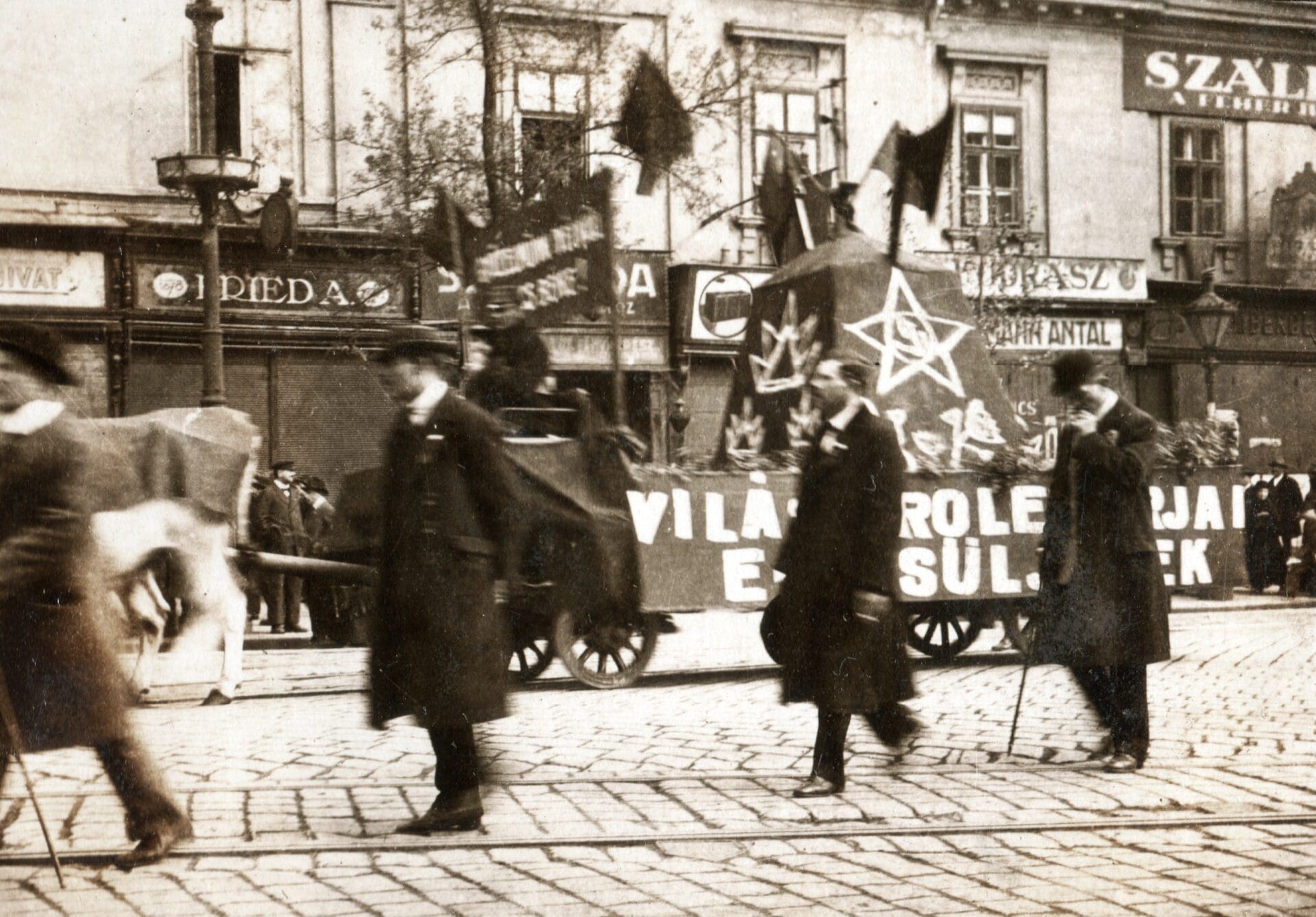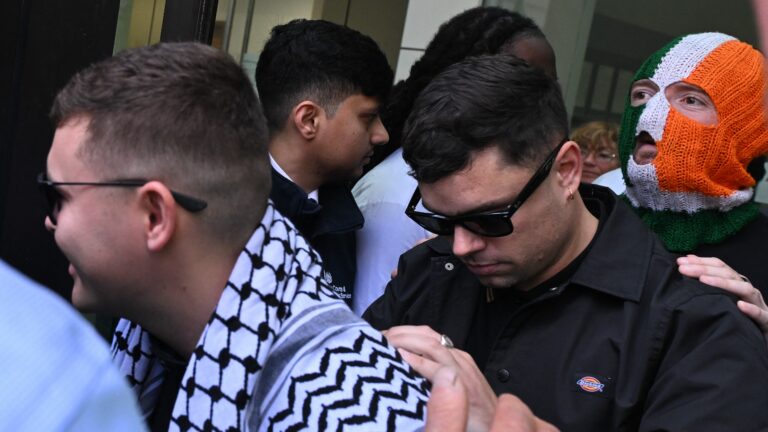The story of anti-Zionism under the 1919 Communist dictatorship between 21 March and 1 August 1919, also referred to as ‘the Commune’ in Hungary, is the story of how an attitude of uninformed tolerance of Zionism on the part of those in power turned into outright persecution. In November 1919, after the fall of the Communist regime, the Zionists in Budapest informed the movement‘s organisational headquarters that ‘Communism has destroyed the results we wanted to achieve: it has suppressed our newspaper, liquidated our businesses and confiscated our property…We are forced to wait for better times.’[i] In response, their foreign colleagues assured them that ‘it is not surprising that Bolshevik rule has paralysed Zionist activities’—suggesting that the unfriendly nature of communism to Jewish nationalism was by then well-known abroad.[ii] Zionist leader Ármin Beregi pointed out in his memoirs that ‘there was hardly any Zionist life under communism’,[iii] and it is known that prominent Zionists were indeed preparing for inactivity during the period. It is also known from movement sources that Zionist leader—and Holocaust martyr—Ottó Komoly (Kohn) ‘sought refuge in his books’ during the 1919 Soviet Republic, because he considered it unnecessarily fir Jews ‘to lead the Hungarian people’, instead of being occupied with the affairs of their own people, and with the building of the Jewish state.[iv] Two other emblematic Hungarian Zionists, the aforementioned newspaper editor Schönfeld and the publicist Lajos Simon also went into voluntary intellectual exile.[v]
Beregi, however, took a more serious and public role. The former staff of the National Price Policy Council (Országos Árpolitikai Tanács), headed by their former president Miklós Degré, asked Beregi, who was declared to be ‘on good terms’ with some Communist People’s Commissars, including Gyula Lengyel, Vilmos Böhm and Jenő Varga, to act as mediator. In his memoirs, Beregi described Béla Kun as a fake communist—a ‘pseudo-Soviet’—but, as he wrote, during the revolution ‘the Reds’ considered him their man of confidence’, even though ‘they knew very well that’ that he was a Zionist leader.’ According to Beregi, the communists saw Zionism as ‘some kind of mild communism with a Jewish national background’ because of a ‘strange misunderstanding’.[vi]
There may have been indeed such ‘strange misunderstandings’, but there were also examples to the contrary.
At a session of the National Assembly in September 1920, Károly Schandl, a smallholder deputy, read out a memorandum originally published by the nationalist press, allegedly submitted by the Hungarian Zionist Organisation to the Revolutionary Governing Council a little more than a year before. The text makes it clear that Zionism ’was conceived in the spirit of socialist doctrines from the very beginning’ and stresses that it is different from other ’capitalist’ national movements. The text pledges that the Zionist movement would put itself ’entirely at the disposal of the revolutionary government’, calls for support of Aliyah and for the appointment of a ‘Jewish People’s Commissar’ to ‘remove once and for all’ the ‘old capitalist spirit’ from ‘Jewish institutions’. The same People’s Commissar should be charged with the phasing out Jewish institutions that might resist the changes and, above all, with the conversion of the Jewish communities into people’s communities.’[vii] It is unclear when exactly the memorandum was sent and what the response was, but there is another source that suggests that some Zionists tried to establish cordial relations with the Commune: in mid-May, a congratulatory telegram was sent to the first National Assembly of the Councils by the socialist-Zionist organisation Poalei Tziyon. It is unclear where the offices of the Hungarian branch were, however, nor what its size and degree of influence were.[viii]
As for the Zionist press, some revolutionary issues were indeed published in the movement’s mouthpiece Jewish Review (Zsidó Szemle), under the title Our Future (Jövőnk). The paper came out without the names of the editors, and with an unsigned editorial celebrating the Commune. As the article said, the dictatorship of the proletariat would put an end to pogroms, and Zionism—described as ‘colonialism’, but not in the pejorative sense of the word—‘has from the beginning operated in the spirit of pure communism’. The editorial claimed that communism respects the ‘right of peoples to self-determination’. ‘We are a people, we have our own cultural and economic needs, and within the communist order our right to self-determination must be recognised…The old order has fallen: long live the new order, our order.’[ix] The paper also published an article under the name of known Zionist author Lajos Simon, which also praised the Council Republic.[x] It is questionable whether these articles were actually written by the editorial staff or by the authors mentioned. In the liberal Jewish weekly Equality (Egyenlőség), articles in the same vein were published, the only difference being that the argument they used was that Judaism had always been socially sensitive. The headlines of the Communist issues of Equality also included the name of the editorial board, and editor-in-chief Lajos Szabolcsi subsequently distanced himself from the content of the issues, saying that their editorial machines had been confiscated and put to work by Communist agents. Although the Zionist press, by contrast, did not disavow its pro-Commune pieces, the question of whether the editorial staff really did greet the Commune with the above words remains unanswerable.
Anti-Zionist rhetoric soon reared its head in the publications of the Soviet Republic.
A Zionist report from the beginning of the Horthy era quoted from an anti-Zionist pamphlet published during the Republic of Councils, although the original full text is not known. According to the report, ‘the men of [Communist dictator] Béla Kun ‘distributed’ leaflets stating that ‘Zionism is nothing but a Jewish version of clerical reaction and medieval drunken superstitions’ and that ‘their example shows that intolerance has Jewish adherents, too.’ Zionism,’ the report quotes an unnamed communist newspaper, ‘has to be fully eradicated.’[xi] By mid-April 1919, the Hungarian Zionist Organisation was banned, and Zionist papers ceased publication. Oszkár Fáber, the People’s Commissar responsible for the liquidation of church property, paid special attention to the Zionist movement. According to the minutes of the Budapest Revolutionary Central Workers’ and Soldiers’ Council’s Executive Committee, Fáber said: ‘The Zionists have not yet been caught, but they will be caught, because they are hiding money big time. He asked the comrades to inform him immediately were they to find any hiding places.’ In his speech, Fáber he emphasized that he planned to bring those who concealed their wealth before a revolutionary tribunal. [xii] It is known that in July 1919, in the 6th district of Budapest, ‘residents’—obviously Jewish, Zionist people—who were hiding the money of the Jewish National Fund funds were ordered to hand over what they had collected for the purchase of land in Palestine to the Communist state within 48 hours.[xiii]
Beregi mentioned in his memoirs that he had personally lodged a protest with dictator Béla Kun when the Communist government wanted to imprison the Galician Jews in a ‘concentration camp’.[xiv] His memoirs should be treated with some caution here: on the one hand, Beregi was apparently trying to draw a parallel between the events of that time and the Holocaust (‘Hitlerism had already reared its head’, he wrote); on the other hand, the Soviet government did not want to imprison the Galician Jews in a ‘concentration camp’—they ‘just’ wanted to deport them to the neighbouring countries—and it is unlikely that Beregi, who took advantage of his fragile modus vivendi, would have protested to Kun personally. But he was undoubtedly right in that some of the measures taken by the Soviet government at that time could already be seen to be anti-Jewish—both by the Jews and by the antisemites the government was trying to persuade to support them. ‘Béla Kun is using the same means to vent popular anger as all weak governments do: he issues decrees against the Jews,’ Beregi concluded in his contemporary memoirs.
Finally, the fall of the Communist dictatorship in 1919 gave way to a pseudo-democratic right-wing regime, the Horthy-period, which posed different challenges to Zionism—but that will be the topic of another article.
[i] Also quoted by László Bernát Veszprémy, in ‘Baloldali antiszemitizmus, anticionizmus és a zsidó vagyon államosítása a Tanácsköztársaság idején’, Századok, 2019/5. 887–916.
[ii] Central Zionist Archives (Jerusalem, hereinafter CZA), Z4/41010, 19 January 1920, quoted by Veszprémy in ‘Baloldali antiszemitizmus’.
[iii] CZA, A129/2, The autobiographical recollections of Ármin Beregi (January 1950), 16. Quoted by Veszprémy, ‘Baloldali antiszemitizmus’.
[iv] Yad Vashem Archives (Jerusalem), P.31/52. Ottó Komoly’s estate. Undated biographical notes about Komoly by Ervin Abádi, 18. Quoted by Veszprémy in ‘Baloldali antiszemitizmus.
[v] CZA, A129/2, The autobiographical recollections of Ármin Beregi.
[vi] CZA, A129/2. The autobiographical recollections of Ármin Beregi.
[vii] ‘Schandl Károly beszéde’, 16 September 1920, Nemzetgyűlési napló, 5:339–340.
[viii] ‘A tanácsok első országos gyűlése a városi színházban’, Népszava, 1919. május 17. 4.
[ix] Jövőnk, 30 March 1919, 1.
[x] Lajos Simon, ‘A tanácsköztársaság és a zsidóság’, Jövőnk, 30 March 1919, 2–3.
[xi] CZA, Z4/41010.
[xii] Budapest Főváros Levéltára (The Archives of the Budapest Municipality, hereinafter BFL), XVI.1.c., Box 1, A Budapesti Forradalmi Központi Munkás és Katonatanács 80-as Intéző Bizottságának jegyzőkönyvei, 5 June 1919, 58.
[xiii] ‘Munkás és katonatanácsok közleményei’, Népszava, 27 July 1919, 8.
[xiv] CZA, A129/2. The autobiographical recollections of Ármin Beregi, 16.








